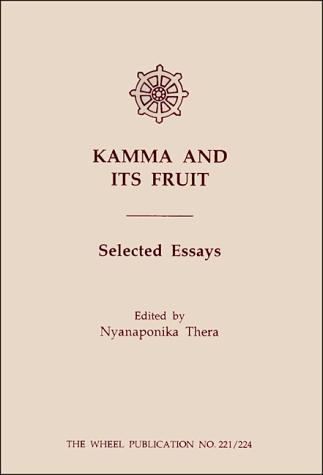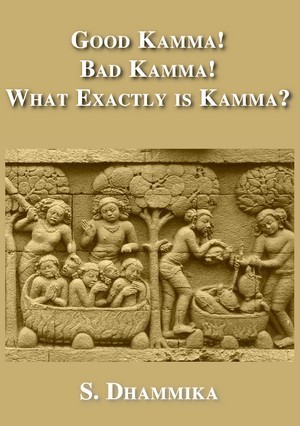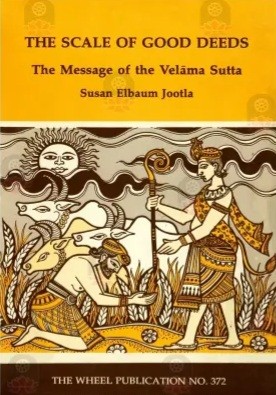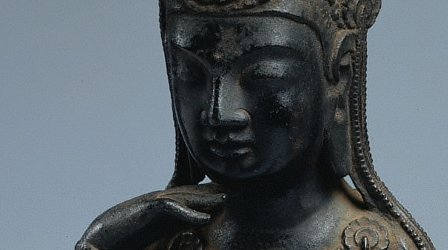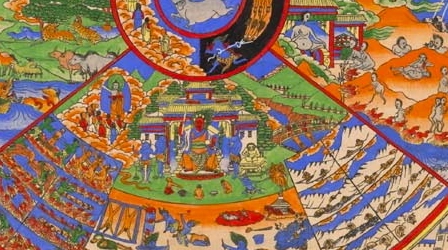Karma
Subscribe to this topic via: RSS
Kamma literally means “action” but in Indian philosophy it specifically refers to theories of the consequences of our actions.
The Buddha taught that it is the moral valence of our actions and the motivations behind them—whether wholesome or unwholesome—which determines whether an action will yield positive or negative consequences for us and others in the future.
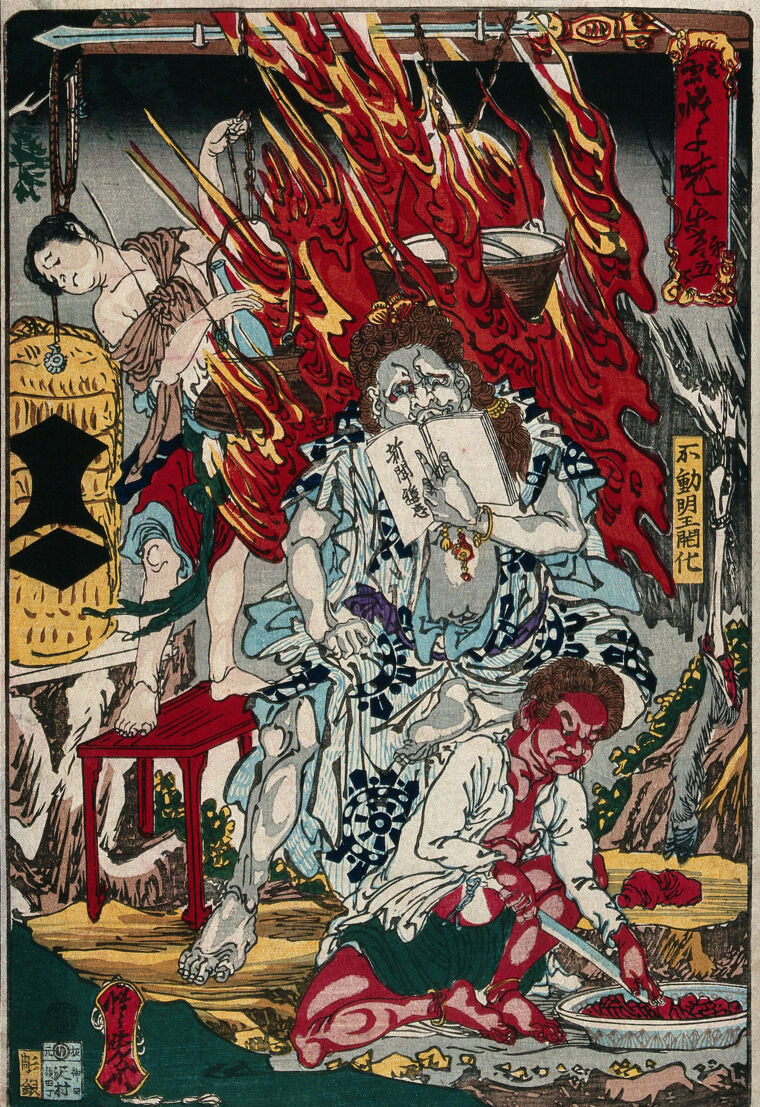
This 1874 woodblock by Kawanabe Kyōsai depicts Japanese people dodging flames and turning into demons as they make alcohol, butcher meat, and blindly embrace "Modernity." Buddhists believe that "Wrong Livelihood" harms our minds and leads to suffering.
Table of Contents
Books (11)
Featured:
-
Now a great producer of happiness is the making of good kamma. What is good about it? It is rooted in non-greed (generosity, renunciation), or in non-hate (loving kindness, compassion) or finally in non-delusion (wisdom, understanding).
See also:
Canonical Works (92)
Featured:
-
The Buddha enumerates the ten meritorious deeds and their lavish results to a great Naga king.
-
⭐ Recommended
… an enemy wishes of an enemy, ‘O, may this person sleep badly!’
-
Kokālika has been reborn in the Pink Lotus hell because of his resentment for Sāriputta and Moggallāna.
-
⭐ Recommended
… if sentient beings only knew, as I do, the fruit of giving and sharing, they would not eat without first giving
-
⭐ Recommended
Protecting oneself, bhikkhus, one protects others; protecting others, one protects oneself.
-
Debt in the world, debt in the training, and the highest freedom from debt.
-
The Buddha explains why even the same gift may result in different benefits for different people, explaining karma and giving a hint at the nature of Buddhist ethics.
-
What kind of person isn’t thrown in jail for stealing half a dollar, a dollar, or a hundred dollars? A person who is rich, affluent, and wealthy.
-
I do not recall any mental exultation arising because deities come to me
-
Kassapa, if one thinks, ‘The one who acts is the same as the one who experiences the result,’ then one asserts with reference to one existing from the beginning: ‘Suffering is created by oneself.’ When one asserts thus, this amounts to eternalism.
-
A wise man in the world of the living should avoid bad deeds.
-
But I offered them much more food than you did! Yet, I have been born in a lower heavenly world. Having offered very little, how did you receive more happiness than me?
-
I am one of those in the world who sleep well.
-
What is the difference between greed, hatred, and delusion?
-
The Buddha explains the benefits of giving that are visible in the present life, and one that is only apparent in the next.
-
The heart’s wish of one who is virtuous succeeds because of his purity.
-
Monks, there are these eight bonanzas of merit, rewards of skillfulness, nourishments of happiness…
-
How is it, Master Gotama: are pleasure and pain created by oneself?
-
The heartwarming story of a low-born peasant becoming a true “brahmin” this sutta reminds us that karma is not destiny.
-
⭐ Recommended
You should train like this: ‘We will fear the fault apparent in the present life, and we will fear the fault to do with lives to come.’
-
⭐ Recommended
Five deeds that irredeemably condemn the perpetrator to hell.
-
⭐ Recommended
Mendicants, there are these three sources that give rise to deeds. What three? Greed, hate, and delusion are sources that give rise to deeds.
-
⭐ Recommended
Mendicants, don’t fear good deeds. For ‘good deeds’ is a term for happiness…
-
Any mendicant who abuses and insults their spiritual companions, speaking ill of the noble ones, will, without a doubt, fall …
-
Karma that’s dark, bright, both, and neither.
-
In which the Buddha claims that karma, the devas, and atmospheric effects can all contribute to the weather.
-
Giving and moral conduct,
developing a mind of love… -
… when Sakka, lord of the devas, was a human being, he adopted and undertook seven vows
-
Witless fools behave
like their own worst enemies,
doing wicked deeds… -
Love is more fruitful than generosity.
-
The astute praise diligence in making merit.
-
What, bhikkhus, is old kamma? The eye is old kamma, to be seen as generated and fashioned by volition…
-
…when a bhikkhu develops and cultivates the Noble Eightfold Path, whenever evil unwholesome states arise, he disperses them and quells them on the spot.
-
Suppose a tree were leaning toward the east… When its root is cut, which way would it fall?
-
The four factors of stream-entry—with ethics as the fourth—are streams of merit, and like the ocean cannot be fathomed.
See also:
Readings (56)
Featured:
-
This article explains what makes actions wholesome (kusala) or unwholesome (akusala) and the various karmic effects of such actions through a close look at relevant Pāli suttas. It ends with a brief comparison with Western ethical theories.
-
How understanding karma contributes to the gradual path.
-
⭐ Recommended
A translation of the twelfth discourse in the Chinese Dīrgha-āgama with a short introduction by Bhikkhu Anālayo.
-
🥇 Best of
The same Indo-European metaphor for abusing paternal property is traceable in the Middle Iranian and Indic tradition, ranging from Vedic to (Buddhist) Sanskrit dāyāda-.
-
⭐ Recommended
How can one make sense of ethical action when one is always already partly the other?
-
Kamma is neither fatalism nor a doctrine of predetermination.
-
🥇 Best of
Across the Buddhist world, we find not only that our relationships are constituted by karmic affinities, but also that in many contexts those relationships are seen as the media through which karma unfolds.
-
We are going to give the departed the opportunity to rejoice in the good we have done.
-
I mean, thank God that the people that run this world are not smart enough to keep running it forever.
See also:
Audio/Video (19)
Featured:
-
⭐ Recommended
One of the toughest interviews I’ve ever had.
-
When you understand the world that you are in and you are in that place of mental fortitude, then you’re not looking for anything “out there.” But maybe you have something to offer people who are caught up in their fears.
-
Shinjin is the true cause of birth in the Purland.
-

-
What if each time
you caused pain
a small round stone
was put in your pocket…5 min
See also:
